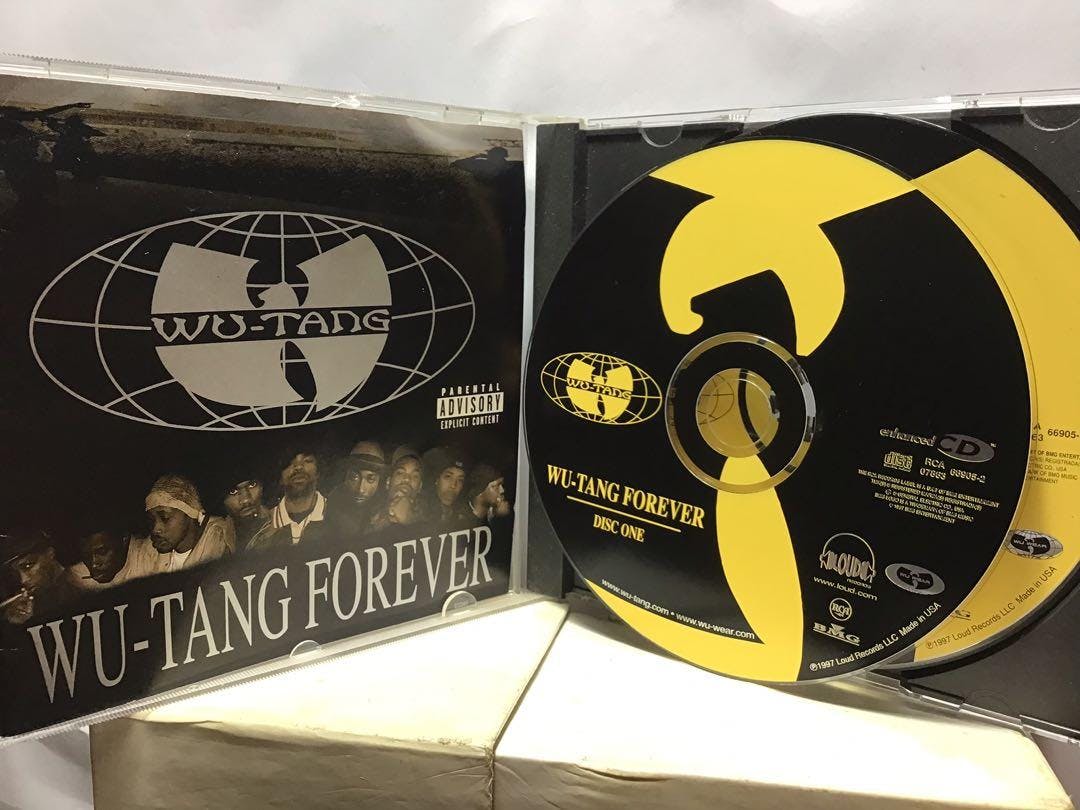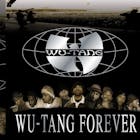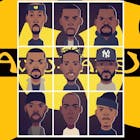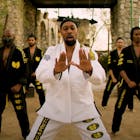
Wu-Tang Prophecies: 25 Years of Swinging Swords
Wu-Tang Prophecies: 25 Years of Swinging Swords
By Kevin Coval
Published Fri, June 3, 2022 at 6:00 PM EDT
The Clan's second studio record comes after a barrage and bum-rushing of the industry and a fruition of RZA's five year plan. RZA the genius, respectfully.
How is he not the head of the state department after these chess move, Sun-Tzu calculations that catapulted the 9 member crew (ten with Cappadonna) to the (hard)core of the culture at a tumultuous moment in its (still) young history. In 1997, just over 20 years into its contemporary practice, the community was at a crossroads, particularly in New York, Hip-Hop's birthplace.
The world had recently experienced the senseless murders of 2Pac and The Notorious B.I.G. due to, in part, the tabloid fanning of flames pitting the East and West Coast against each other in a war to make multi-national media companies richer than they already were (and at the continued expense of Black lives). '97 was also, as some argue, the beginning of "The Shiny Suit" era, ushered in by Puff's sleek, over-production and questionable fashion choices.
But RZA foretold the unfolding of Wu, developing the greatest run of albums in the history of music (yeah, I said it.) In a highly competitive contact art and fickle environment with gigantic innovative leaps taking place weekly, sometimes daily, to put together solid, back to back projects can be incredibly difficult (ask Nas). To string three solid projects in a row is a feat of mastery, four is legendary (Jay, Ye, Kendrick, KRS) But Wu, under the soul/sole-controller supervision of The Abbot, put out seven unfuckwitable records in a row, starting with Wu-Tang Clan's Enter the Wu-Tang...36 Chambers and ending on Ghostface's Ironman!
Which means, Wu-Tang Forever is the 8th album in their oeuvre. The numerology significant and not lost on anyone that the 8 made horizontal is the infinity sign = forever. But Wu-Tang Forever is a double album, meaning 9 for the original members of the clan and in Supreme Mathematics, 9, equates to "born", because Wu-Tang Forever solidifies the crew's place in eternity and completes the cycle RZA conceived of in his studio basement in Staten Island.
The double album/disc era ushered in some remarkable and forgettable undertakings. Wu-Tang Forever comes on the heels of 2Pac's All Eyez On Me in February of 1996 and B.I.G.'s posthumous double album, Life After Death, in March of 1997. While the double album was not unheard of in Hip-Hop, (DJ Jazzy Jeff and The Fresh Prince released the double LP He's the DJ, I'm the Rapper in 1988), it was uncommon until these three albums' run and the commercial success of these efforts.
I will not go into the necessity, or achievements, of the double-disc era, (even Jay-Z reissued The Blueprint 2 as a revised, slimmed-down version, The Blueprint 2.1), but what the double album era signified was that Hip-Hop in the mid-to-late 90s and into the early aughts was big business that record, and media companies could no longer keep in the minor leagues. ...Forever was #1 on the Billboard 200 in week #1 and ultimately sold 4x platinum. WTF indeed.
The double album for the Wu felt earned and highly anticipated, even though we had a prolific outpouring of material up until that point. WTF gives us the Clan together again, as Voltron, a full entity, or as GZA states in the first full song of the A side, "Reunited, double LP, world excited/ struck a match the underground, industry ignited". And fans, and naysayers, were wondering if lighting could strike again.
Wu-Tang Forever is more mature record, lyrically and in the production. RZA relinquished some control of beat-making duties to True Master, 4th disciple, and Inspectah Deck. WTF is denser than ...36 Chambers, which is not a judgement of aesthetics. There is just more here in every sense of the word. RZA continues utilizing sparseness and strings in signature ways but adds sped up soul samples to his beat making bag, that will go on to influence Just Blaze and Ye as producers and usher in, more melody and musicality in the sonics of genre.
WTF is also the fruition of the group's collective mythologies. The Wu conceived of a world, an island of Shaolin, they wanted to live and survive in. Ginseng roots, kung-fu flicks, harrowing noir, 5% wisdom, Eastern philosophies, hustler game and witty unpredictable street slang. A brotherhood forged in blood (kin) and sweat from a collective hodge podge of has-beens (RZA and GZA dropped from their major labels) and never will (killer) bees, sequestered on the forgotten borough of Staten Island.
In an unreleased documentary on the making of Wu-Tang Forever, RZA said the album is a manual "showing people how you can escape from hell." He means a mental and physical prison. That the conditions of life; white supremacy, the militarized police state, the prison industrial complex and late capitalism, all, create for Black folk in particular, aka The G-ds and The Earths, a minefield in which one must navigate intelligently. Wu-Tang Forever is document of the crew's more enlightened state, an advancement five years later and continuation of their "Killer Bee" project to infest and infect the mainstream via sub-and-counterculture, in order to wake up the 85% of the "dead, dumb and blind." The Wu are freedom fighters and Wu-Tang is forever, a metaphysical reality because you cannot destroy energy and vibrations.
DROP YOUR EMAIL
TO STAY IN THE KNOW
"Wu Revolution," the first track, is a manifesto, from Papa Wu (RIP), RZA's older cousin and spiritual mentor to the whole clan. Papa Wu discusses the mental war being waged against Black people, then, now and historically. He urges the listeners, the disciples, "It's time to rise and take our place." Papa Wu is talking about a full-fledged cultural revolution, about the reinstatement of Black folks to places of equity and leadership in colonial culture that has dehumanized them. The Wu trumpets the rise of Black creativity and sees themselves as populists trying to energize and enliven the masses to free themselves from the "mental war" to "take the devil off your plane." The Wu are jihadists, in the Islamic spiritual sense, fighting for freedom in a war against those forces that seek to shackle.
Wu-Tang Forever is revolutionary throughout and while I will not go into every track, there are a lot of them, my highlights start off with, "Reunited." Out the gate, GZA, in dawn of the shiny suit era defends with urgency the integrity of Wu's aesthetic project. He is drawing a line in the sand and a point of contention and differentiation when he says, "Wicked (dudes) come, try to burglarize the turf/ Scatting off soft-ass beats them (dudes) rap happily/Tragically, that style deteriorate rapidly." The East Coast and the culture as a whole must uphold its style and subject matter as the industry moves away from so-called street or reality raps to enter the ostentatious realms of hyper-capitalist fantasy and champagne popping.
Directly following The Genius, his cousin, Ol' Dirty Bastard, has one of his best verses of all-time. We tend to think of Dirty as an abstract absurdist, the jester of the Clan, which undoubtedly he is, but on "Reunited", we get a different complexity. Here he asserts his metaphorical realism with the bar, "My name black, you worms wanna play in my dirt / Bitch stop, my Momma serve free lunch from the church." My name (is) Black! sounds Baldwinian. And he continues from there and does not disappoint with his characteristic, graphic hyperbole when he says, "I cum like a thousand doves" and the memorable, often quotable, "I don't walk, I get carried". All this, over the piercing, unforgettable violin strings of Israeli musician, Miri Ben-Ari.
Dirt continues, by calling upon his, and RZA and GZA's, ancestral lineage when he rhymes, in his off-beat staggered signature, "The Indian that sold Manhattan to the white man / My grandfather" And although I'm not Henry Louis Gates, ODB's grandfather is Chief Fred Cuffie, part of the Shinnecock Indians, who owned a large part of New York, land around Long Island and the Hamptons. All this to say, generations later, Chief Cuffie's grandchildren and kin, have returned to claim their throne.
In the Wu Manuel, RZA write's that Ghostface Killah's verse on Impossible is "the greatest Wu-Tang verse ever written". And there are so many to choose from, but what is clear on WTF, is that Ghost emerges as the preeminent storyteller of the Clan. An elaborate imagist and master of diction, Ghost tells a stark, horrific tale, recounting the loss of a homie to gun violence, in the middle of which, he interrupts the action of the brutal scene, to provide nostalgic context for the listener and to mimic the way the mind searches for a life raft in tragedy. Ghost pens the lines, "When we was eight, we went to Bat Day to see the Yanks / In '69, his father and mines, they robbed banks". After Wu-Tang Forever, Ghost makes his classic sophomore album Supreme Clientele, and it is on ...Forever where we hear him sharpening his swords.


But to be real, the crown jewel of Wu-Tang Forever is "Triumph," the second track on side two. Six minutes of furious bars, no chorus, no hook. If Griselda had a blueprint they took notes from, ...Forever and "Triumph" might be it. Everyone shines on this track, ODB at the top wondering what year it is, Method Man rescuing and remixing cliches, RZA's off-beat staccato non-rhyming 8 bars, GZA's precision and calm, Rae's ferocious punctuation on the track, as Ghost kisses him on the temple at the end of the video (and what brotherhood is more powerful and deadly and beautiful?)
But to even be realer, it's Inspectah Deck's intro that is the lasting legacy of Wu-Tang Forever. (Is there a better verse... ever? Maybe? Some argue this is it.) What's clear is that if you utter the opening line, "I bomb atomically" within earshot of any head, they will east coast stomp, as best they can, through the rest of one of the most memorable and intensely compact, poetic verses in the history of language. Truth be told, between "Triumph" and "Protect Ya Neck," Deck, who might not of had the most success as a solo artist, is the Rickey Henderson of this rap shit, the greatest lead-off hitter of all-time.
Later in the verse he spits, "Behold the bold soldier, control the globe slowly / Proceeds to blow, swinging swords like Shinobi". Bars, yes. Shinobi is a covert class of agents in feudal Japan, a ninja of espionage, who infiltrates the adversary's lair. Is there a more appropriate metaphor for the impact Wu-Tang Clan has had on global cultural consciousness? They are universally beloved, and in doing so have helped, slowly (and there is a long way to go) to affect the consciousness of the planet and wake the many to their brilliance. Wu-Tang Forever, for real, and let the congregation say, Amen.






